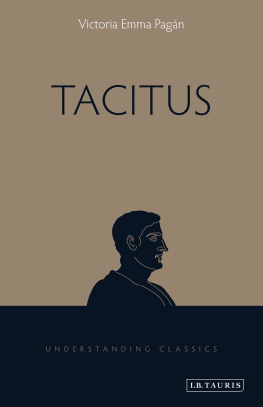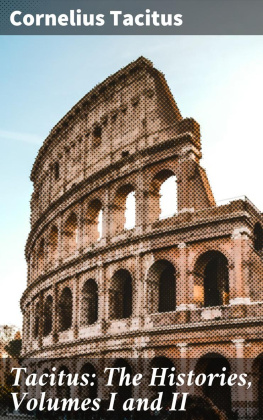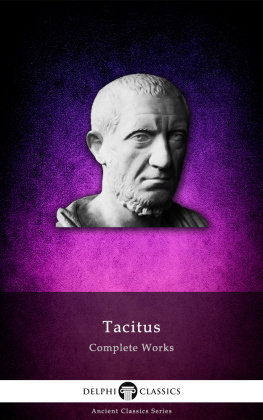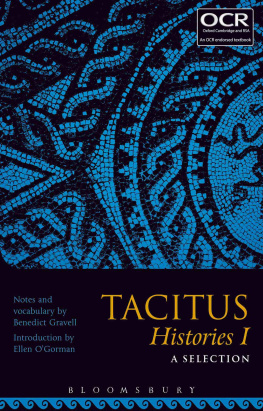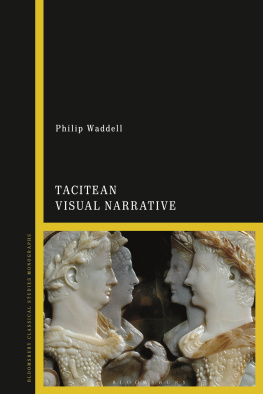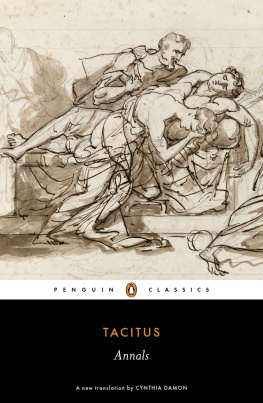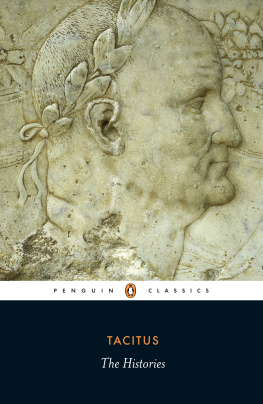

The greatest of Roman historians, Publius Cornelius Tacitus ( c. 56120 CE ) studied rhetoric in Rome; and his rhetorical and oratorical gifts are evident throughout his most substantial works, the incomplete but still remarkable Annals and Histories . In elegant, unsurpassed Latin prose, marked by sometimes bitter and ironic reflections on the human capacity to abuse and misuse power, Tacitus charts the violent trajectory of the Roman Empire from Augustus death in 14 CE to the end of Domitians rule in 96. Victoria Emma Pagn looks at Tacitus from a range of perspectives: as a literary stylist, influenced by Sallust; his notion of time; his modes of discourse; his place in historiography; and the later reception of Tacitus in the Renaissance and early modern periods. Tacitus remains of major interest to students of the Bible, as well as classicists, by virtue of his reference to Christus and Neros persecution of the Christians after the Great Fire of Rome in 64 CE . This lively survey enables its readers fully to appreciate why, in holding up a mirror to venality and greed, the work of Tacitus remains eternal.

Victoria Emma Pagn is Professor of Classics at the University of Florida. The editor of A Companion to Tacitus (2012), she is in addition the author of Conspiracy Narratives in Roman History (2004), Conspiracy Theory in Latin Literature (2012) and Rome and the Literature of Gardens (2006).
Victoria Pagns lively new survey of Tacitus works and their impact is especially interesting for her original contribution to our understanding of how twentieth- and twenty-first-century poets, painters, dramatists, composers and filmmakers have brought the historians trenchant worldview into our own time. Recommended highly to students and general readers.
Ronald Mellor, Distinguished Research Professor of Ancient History, UCLA
Understanding Classics
Editor: Richard Stoneman (University of Exeter)
When the great Roman poets of the Augustan Age Ovid, Virgil and Horace composed their odes, love poetry and lyrical verse, could they have imagined that their works would one day form a cornerstone of Western civilization, or serve as the basis of study for generations of schoolchildren learning Latin? Could Aeschylus or Euripides have envisaged the remarkable popularity of contemporary stagings of their tragedies? The legacy and continuing resonance of Homers Iliad and Odyssey Greek poetical epics written many millennia ago again testify to the capacity of the classics to cross the divide of thousands of years and speak powerfully and relevantly to audiences quite different from those to which they were originally addressed.
Understanding Classics is a specially commissioned series which aims to introduce the outstanding authors and thinkers of antiquity to a wide audience of appreciative modern readers, whether undergraduate students of classics, literature, philosophy and ancient history or generalists interested in the classical world. Each volume written by leading figures internationally will examine the historical significance of the writer or writers in question; their social, political and cultural contexts; their use of language, literature and mythology; extracts from their major works; and their reception in later European literature, art, music and culture. Understanding Classics will build a library of readable, authoritative introductions offering fresh and elegant surveys of the greatest literatures, philosophies and poetries of the ancient world.
Understanding Classics
Archimedes
Chris Rorres Drexel University, Pennsylvania
Aristophanes and Greek Comedy
Jeffrey S. Rusten Cornell University
Augustine
Dennis E. Trout Tufts University
Cicero
Gesine Manuwald University College London
Euripides
Isabelle Torrance University of Notre Dame
Eusebius
Aaron P. Johnson Lee University, Tennessee
Homer
Jonathan S. Burgess University of Toronto
Horace
Paul Allen Miller University of South Carolina
Latin Love Poetry
Denise McCoskey & Zara Torlone Miami University, Ohio
Martial
Lindsay C. Watson & Patricia Watson University of Sydney
Ovid
Carole E. Newlands University of Wisconsin, Madison
Pindar
Richard Stoneman University of Exeter
Plutarch
Mark A. Beck University of North Carolina, Chapel Hill
The Poets of Alexandria
Susan A. Stephens Stanford University
Roman Comedy
David Christenson University of Arizona
Sappho
Page DuBois University of California, San Diego
Seneca
Christopher Star Middlebury College, Vermont
Sophocles
Stephen Esposito Boston University
Tacitus
Victoria Emma Pagn University of Florida
Virgil
Alison Keith University of Toronto

Published in 2017 by
I.B.Tauris & Co. Ltd
London New York
www.ibtauris.com
Copyright 2017 Victoria Emma Pagn
The right of Victoria Emma Pagn to be identified as the author of this work has been asserted by the author in accordance with the Copyright, Designs and Patents Act 1988.
All rights reserved. Except for brief quotations in a review, this book, or any part thereof, may not be reproduced, stored in or introduced into a retrieval system, or transmitted, in any form or by any means, electronic, mechanical, photocopying, recording or otherwise, without the prior written permission of the publisher.
Every attempt has been made to gain permission for the use of the images in this book. Any omissions will be rectified in future editions.
References to websites were correct at the time of writing.
ISBN: 978 1 78076 317 0 (HB)
978 1 78076 318 7 (PB)
eISBN: 978 1 78672 132 7
ePDF: 978 1 78673 132 6
A full CIP record for this book is available from the British Library
A full CIP record is available from the Library of Congress
Library of Congress Catalog Card Number: available
Text designed and typeset by Tetragon, London
For John, Marc, Mike, Mary and Julia
Acknowledgements
The length of this paragraph of acknowledgements is in inverse proportion to the debt I owe to the institutions and individuals who have supported my study of Tacitus ever since I first read the Annals with David Potter in the autumn of 1988. I would like to thank Richard Stoneman, Alex Wright and the team at I.B.Tauris for their patience, and Ellie Wolpert for her technical assistance. I am grateful for the research support provided by the University of Florida College of Liberal Arts and Sciences, Office of Research and Department of Classics. For their daily encouragement and kindness I thank my husband, son and daughter. I dedicate this book to my dear brothers and sisters. Each will know best why.

